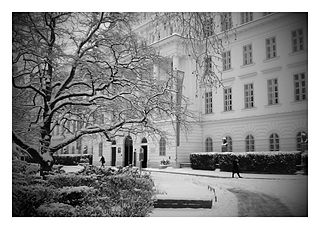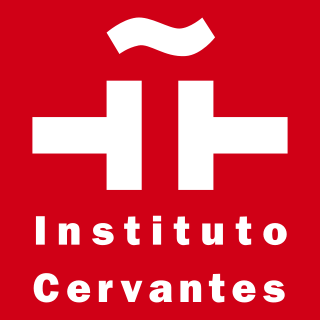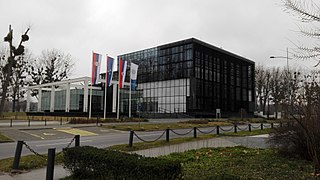Related Research Articles

Science education is the field concerned with sharing science content and process with individuals not traditionally considered part of the scientific community. The learners may be children, college students, or adults within the general public; the field of science education includes work in science content, science process, some social science, and some teaching pedagogy. The standards for science education provide expectations for the development of understanding for students through the entire course of their K-12 education and beyond. The traditional subjects included in the standards are physical, life, earth, space, and human sciences.

TU Wien is one of the major universities in Vienna. The university has received extensive international and domestic recognition in teaching as well as in research, and it is a highly esteemed partner of innovation oriented enterprises. It currently has about 28,100 students, eight faculties and about 5,000 staff members. The university's teaching and research is focused on engineering, computer science, and natural sciences.

The Cervantes Institute is a worldwide non-profit organization created by the Spanish government in 1991. It is named after Miguel de Cervantes (1547–1616), the author of Don Quixote and perhaps the most important figure in the history of Spanish literature. The Cervantes Institute, a government agency, is the largest organization in the world responsible for promoting the study and the teaching of Spanish language and culture.
Coop Himmelb(l)au was founded by Wolf D. Prix, Helmut Swiczinsky, and Michael Holzer in Vienna, Austria in 1968. It is active in architecture, urban planning, design, and art. In 1988 a second studio was opened in Los Angeles. Further project offices are located in Frankfurt, Germany and Paris, France. COOP HIMMELB(L)AU employs between 50 and 150 people.

GeoGebra is an interactive geometry, algebra, statistics and calculus application, intended for learning and teaching mathematics and science from primary school to university level. GeoGebra is available on multiple platforms with its desktop applications for Windows, macOS and Linux, with its tablet apps for Android, iPad and Windows, and with its web application based on HTML5 technology.

The University of Novi Sad is a public university in Serbia. It is one of the most important educational and research centers in South Eastern Europe with around 42,500 students and 3,700 staff members. It is composed of 14 faculties and three institutes located in four university cities - Novi Sad, Sombor, Subotica and Zrenjanin. It belongs to the group of comprehensive universities, which are characterized by providing nearly all fields of science and higher education.

Waldorf education, also known as Steiner education, is based on the educational philosophy of Rudolf Steiner, the founder of Anthroposophy. Its pedagogy strives to develop pupils' intellectual, artistic, and practical skills in an integrated and holistic manner. The cultivation of pupils' imagination and creativity is a central focus.

The Pedagogical University of Cracow, was named after the Commission of National Education created by King Stanisław August Poniatowski. It is a public university located in Kraków, Poland. It was founded soon after the conclusion of World War II, on May 11, 1946 originally as the National Higher College of Teacher Training. Its aim is the training of highly qualified teaching staff for the Polish educational system.

Founded in 1553, the Akademisches Gymnasium is the oldest secondary school in Vienna. Today, it is state-run and therefore nondenominational and non-feepaying. The school offers a humanistic education and is known to be rather liberal compared to other traditional secondary schools in the city. Currently, there are approximately 600 pupils in 24 classes.
The Akademisches Gymnasium Innsbruck is a grammar school, or Gymnasium in Innsbruck, Tyrol, founded in 1562 by the Jesuits in the course of the counter-reformation. Thus, it is the oldest school in Western Austria and one of the oldest schools in the German-speaking world.

Heinz Oberhummer was an Austrian physicist and skeptic.

The European Forum Alpbach (EFA) is an Austrian nonprofit organization based in Vienna, Austria. It is best known for hosting the conference of the same name in the village of Alpbach. It is an interdisciplinary platform for science, politics, business and culture with its mission cited as "connecting international decision-makers from all sectors of society with an interested audience and committed young people".
In a paper published in 2007 by Dr. Carl Pennypacker, the Global Hands-On Universe (GHOU) is presented as an educational program that enables students to investigate the Universe while applying tools and concepts from science, math, and technology. Using the Internet, G-HOU participants around the world request observations from an automated telescope, download images from a large image archive, and analyze them with the aid of user-friendly image processing software, as described by Dr. Miller.
European Schoolnet or EUN is a network of 31 European Ministries of Education, based in Brussels. As a not-for-profit organisation, it aims to bring innovation in teaching and learning to its key stakeholders: Ministries of Education, schools, teachers, researchers, and industry partners.

The European Association for Astronomy Education or EAAE is a non-profit European organization for the promotion of science education in general, and of astronomy in particular.

Borys Grinchenko Kyiv University is a higher education institution. The university was established by Kyiv municipal council through reorganization of Kyiv regional Teachers Training Institute named after Borys Hrinchenko. The university is communal property.
The Association of European Film Archives and Cinematheques is an affiliation of 44 European national and regional film archives founded in 1991. Its role is to safeguard the European film heritage and make this rich audiovisual records collected and preserved by the various film archives accessible to the public. ACE is a regional branch of FIAF Fédération Internationale des Archives du Film / International Federation of Film Archives. ACE members are non-profit institutions committed to the FIAF Code of Ethics.

The ASEAN European Academic University Network (ASEA-UNINET) is a network of universities, consisting of European and south-east Asian universities. It was founded in 1994 by universities from Austria, Indonesia, Thailand and Vietnam with the goal of promoting the continuous internationalisation of education and research. Today ASEA-UNINET consists of 83 universities from 17 different countries.

Teodor Janković Mirijevski was a Serbian, Romanian and Russian educational reformer, academic, scholar and pedagogical writer. For his accomplishments in educational reforms he was twice ennobled, by Maria Theresa in 1774 and by Catherine the Great in 1791. Among the great 18th century education reformers of Europe and Russia, Teodor Janković stands alone in that limelight. He became a member of the Russian Academy in 1783.

Werner Gruber is an Austrian Physician, Author, Professor, Cabaretist, Diskudant and well known from ORF and as a member of the Socialdemocratic Party Austria (SPÖ).
References
- ↑ Xplora gateway: Nucleus cluster
- ↑ European Commission: Star Projects